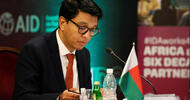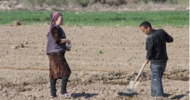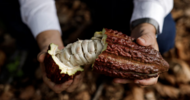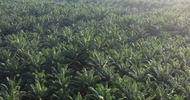Africa is regarded as the New Eldorado, and is attracting many foreign based private or public investment companies, sovereign wealth funds and even pension funds gradually. Sadly, while foreigners continue to play a major role in growth investments, African pension funds' contributions to this growth are dismal.
- Huffington Post
-
17 November 2012
Large-scale agricultural in the developing world have received significant attention in recent months and years. This articles looks at the dynamics of the Ethiopian context and policy recommendations in moving forward.
- Logan Cochrane
-
01 October 2012
February 2012 workshop in Ouidah, Benin brought together over thirty participants from farmer organisations and NGOs in West and Central Africa to share experiences and analysis of land grabs.
Lors d’un atelier organisé par Synergie Paysanne, GRAIN et le RAPDA, avec le soutien de Pain pour le Prochain, à Ouidah (Bénin) du 7 au 9 février 2012, plus d’une trentaine de participants représentant des organisations paysannes et des ONG actives sur les questions d’accaparement des terres en Afrique de l’Ouest et du Centre ont échangé leurs expériences et approfondi cette question.
Leading Australian economists, commentators and even political enemies have joined the federal Minister for Trade and Investment Craig Emerson in condemning Opposition plans to tighten control over foreign investment.
- Live Trading News
-
06 August 2012
Australia's conservative opposition on Friday earmarked tighter scrutiny of foreign investment in agriculture as a priority if the party is elected to government next year, as recent polls suggest.
Between the farmers and Olam lies one of Lao’s most powerful, and some allege, corrupt families, the Siphandones.
A government map leaked to International Rivers delineates sugar plantations with a total area of 2,450 square kilometers – almost the size of Luxembourg – that the Ethiopian government is seeking to develop in the sensitive ecosystems of the Lower Omo Valley.
- International Rivers
-
06 Mar 2012
Draft resolution from the workshop of the Pan African Parliament under the theme Making investment Work for Africa: a Parliamentarian Response to “Land Grabs”
The World Food Program intends to buy some of the grain produced in Ethiopia by foreign investors in order to assist hungry people. Ironically, this group of intended food aid recipients will include those working to produce it in the first place. Ethiopia's government is calling this sustainable development.
Australia is "asleep at the wheel" when it comes to foreign companies buying important agricultural land and greater scrutiny is needed, farmers say.
Internationally-funded Guatemalan palm oil and sugar cane interests evict Mayan Qeqchi families from their historic lands, destroying homes and crops, killing one, injuring more, while thousands are without food or shelter.
- Upside Down World
-
23 Mar 2011
New report by GRAIN shows how Saudi businessmen are pursuing deals in Africa that would give them control over some of the continent's most productive farmlands.
Public opinion is clearly against the Crafar farms sale on the basis that NZ is "selling the farm", while selling a controlling stake in a processing plant is seen as another issue altogether. There is a strong argument for conditionality either way, writes Fran O'Sullivan.
Japan should shun this new kind of colonization like a plague, no matter what well-paid city-based officials may say.
- Japan Times
-
04 April 2010
22. Stresses that farmland acquisition by foreign investors, particularly in Africa, must not have an adverse impact on local food security or lead to unsustainable land use; points out that it may also have positive effects by bringing land into productive use; urges the FAO and the Member States to work towards common rules and legislative proposals which recognise the right of local people in every country to control farmland and other natural resources vital to their food security;
- European Parliament
-
27 November 2009
The left-leaning fisherfolk alliance Pamalakaya and staunch ally KMP on Thursday exposed what they called a secret agricultural pact between the Philippines and Bahrain.
- Pamalakaya and KMP
-
24 June 2009
It's a tsunami of land deals and, as all of the experts who have studied the phenomenon have agreed, no nation is truly prepared for its implications.
- CounterCurrents
-
17 June 2009
Indonesia's new president is literally flooding Papua with new military troops to provide security at a 2 million-hectare food plantation being carved out of jungle outside of Merauke.
- Benar News
-
18 November 2024
A showdown is looming in South Sudan over the draft land ownership policy as the Central Equatoria State Assembly rejected the “land belongs to the people” policy, claiming it is a secret deal to legalize land grabbing.
- Sudans Post
-
15 February 2024
Recent farmland purchases by Chinese, Middle Eastern, and other foreign government investors have raised concerns about food exports being prioritized over domestic consumption.
- The Capitolist
-
12 Mar 2023
The real threat to our food security, according to researchers, is broader corporate ownership and consolidation of American farmland — including by domestic investors.
The most widely publicized threat to the Amazonian rainforest is deforestation. Less well understood is that public lands are being converted to private holdings in a land grab we’ve been studying for the past decade.
- The Conversation
-
02 February 2022
Cambodian families who were forcibly displaced by Phnom Penh Sugar Company have received a promised payment from Australia’s ANZ bank, which financed the sugar company from 2011-2014
A campaign by U.S. and Brazilian activists challenging TIAA and other financial firms’ complicity in land grabs and deforestation in Brazil is scoring major victories.
- Waging Nonviolence
-
01 October 2021
Farmland grabs by US companies and pension funds are being ignored as appropriators prioritise keeping Chinese interests in check, critics say
Une stratégie nationale de l’agribusiness ambitionne d’aménager 4 millions d’hectares d’agropoles à Madagascar
- CRAAD-OI et TANY
-
29 April 2021
A search through the World Bank's archives shines a light on why Africa's post-colonial governments failed to dismantle the plantation model and return lands to their people.
- WRM/GRAIN
-
15 November 2020
The Indonesian government is pushing ahead with a plan to grow crops on a Puerto Rico-sized area of peatlands, despite criticism from experts and a history of similar failed projects.
The type of land use, the concentration of land and natural resources, the destruction of ecosystems, and the homogenization of landscapes, are key elements in the debate on the current health crisis and human resilience.















